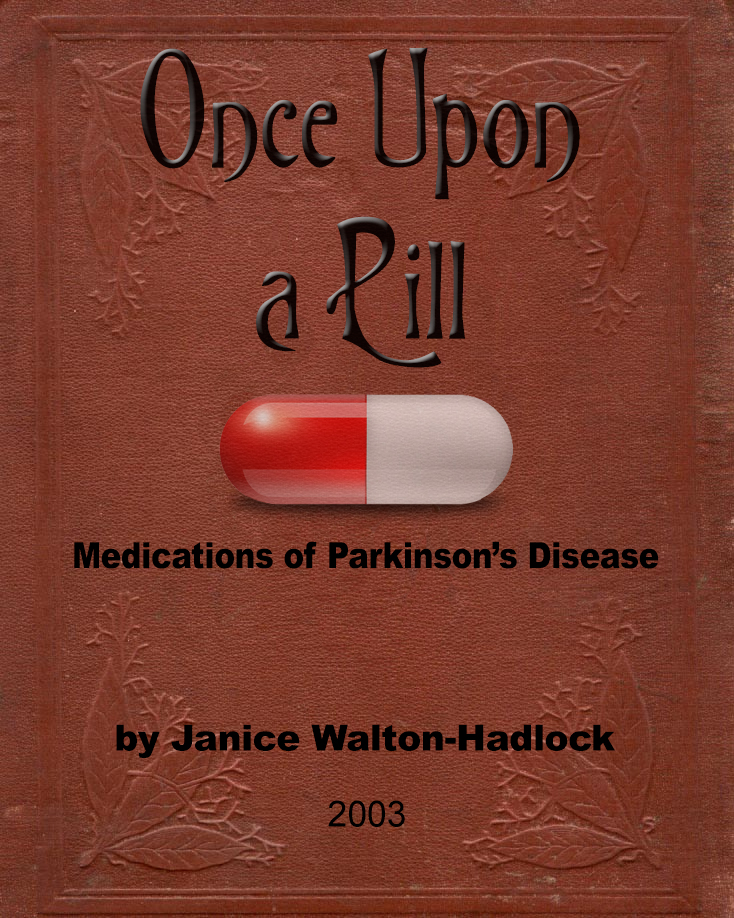 Medications of Parkinson’s Disease or
Medications of Parkinson’s Disease or
Once Upon A Pill:
Patient Experiences With Dopamine-enhancing Drugs and Supplements
Dr. Janice Hadlock, DAOM, LAc
Raja Books
published 2003, 639 pages
This book is an in-depth look at Parkinson’s disease medications and the brain chemistry of Parkinson’s.
Parkinson’s patients using L-dopa, dopamine agonists, MAO inhibitors and other dopamine- enhancing drugs and supplements were closely studied as they participated in a four-year research project sponsored by the non-profit Parkinson’s Recovery Project. The unexpected findings of this project have led to an entirely new hypothesis of how these poorly-understood drugs actually work.
Unlike the dominant paradigm’s understanding of these drugs, which holds that these drugs and their traumatic side effects are fairly “unpredictable”, our new hypotheses provide a way of unraveling the true nature of these drugs. This new understanding has enabled us to make accurate predictions about how dosing and rate of dose changes effect people with Parkinson’s.
Our patients were able to discover safe methods for slowly increasing and decreasing drug doses to control the benefits and adverse effects of the medications.
This book also provides case studies that demonstrate the life-threatening dangers that arose when people recovered from Parkinson’s disease while still under the influence of antiparkinson’s drugs or if they had taken the drugs for a significant period of time.
These tragedies of these medication-using patients led to the Parkinson’s Recovery Project’s conclusion that people who have ever used antiparkinson’s medications for more than three weeks might not be suitable subjects for recovery from Parkinson’s. The Parkinson’s Treatment Team (now retired) decided to not work with people who had ever taken dopamine-enhancing antiparkinson’s medications for more than three weeks. This book gives the chilling details on what led to those decisions.
Even so, people who are currently using antiparkinson’s medication and therefore might not be good candidates for recovery, may learn in this book safe methods for changing their doses so that they experience fewer adverse side effects.
Many people who are not using antiparkinson’s medications have found this book very helpful in understanding the chemistry of Parkinson’s disease and how ongoing western medicine brain research supports Asian medical theory.
This book is over 600 pages long; therefore, we have broken it into small units for ease of downloading. Please note: as a condition of downloading this book, we require that you download the Cover pages section that contains the disclaimer which is a critical part of the book and which must be included in any printing of this book. Anyone who avails himself of this free offering must comply with this requirement.
NOTE: This book is offered for free downloading and printing for individual use only. This material is copyright and all rights are reserved. Please observe the copyright warning on page two of the book.
To download these books, you must have Adobe Acrobat Reader.
To download Adobe Acrobat Reader, CLICK HERE.
This book has never been available in hard copy. The size of the book, 630+ full size (8.5” x 11”) pages, makes it prohibitively large for paperback publication with the current publisher.
The Parkinson’s Recovery Project, a non-profit organization, is making this book available for free download. If you find this book to be helpful, please consider making a tax-deductable donation by clicking on the Donation link.

Is rasagaline considered dopamine enhancing?
Very upsetting news for me. I am on carbidopa/ l-dopa 2x a. day for year & a half.
Am I excluded? Can I slowly go off of the drug?
In her book “Recovery from Parkinson’s” Dr. Hadlock on page 59 gives a case study of a patient who slowly, over more than 18 months, got off all 3 types of PD meds after having been on those meds for 20 years, So it is definitely do-able.
A great majority of PD patients looking for alternative cures will have been on carbadopa/levadopa longer than 3 weeks. How is this info helpful for us?
Like Mary, I’m looking for an alternative cure/treatment to Found out I had PD about three years ago. First started taking selegiline, after about a year added amantadine. Did the neupro patch for about 10 months until the coupon I was using expired and can’t afford anymore. Haven’t started carbadopa/levadopa. If able to get off these drugs, is recovery possible?
Most PD Patients have been on Levodopa or similar PD drugs. So this is hope being handed out, then ripped back out of our hands. And of course no one has an answer. Back to PD square one.
Thank you. Can I have the book